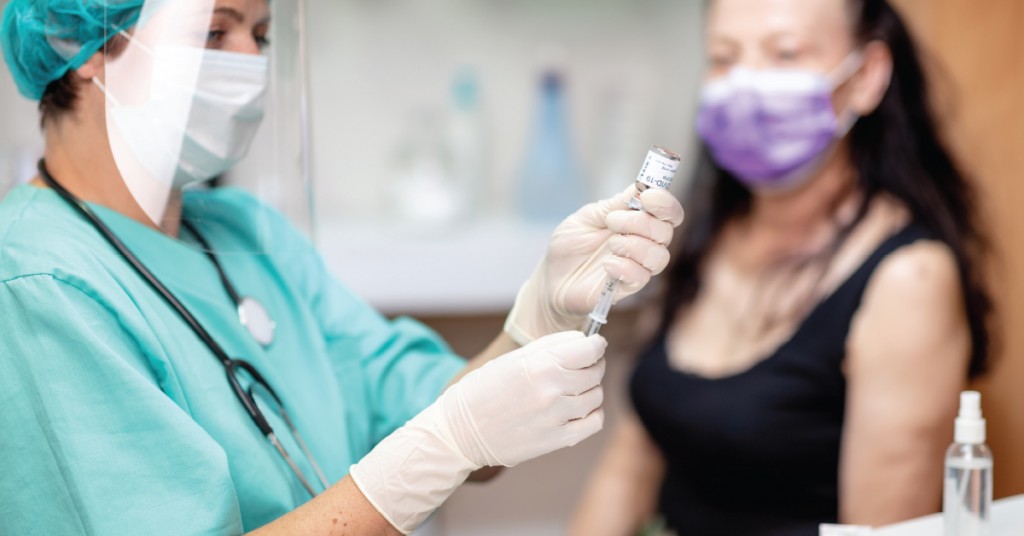COVID-19 Vaccines: It’s Time to Roll Up Your Sleeve
March 11, 2021

Dr. Julide Akman-Carmichael, Physician at Southwestern Medical Center
Nearly one year into the COVID-19 pandemic, most of us have become accustomed to wearing masks, social distancing, virtual schooling, and remote working. We have all made sacrifices to protect ourselves and one another, but there is another very important step you can take to help end this pandemic and get back to normal. As soon as you have the opportunity, please consider getting the COVID-19 vaccine.
The first COVID-19 vaccines were granted emergency use authorization from the Food & Drug Administration (FDA) in December. At Southwestern Medical Center, we are proud so many of our healthcare heroes stepped up and decided to get vaccinated so we can help bring this pandemic to an end and continue advancing our mission of Making Communities Healthier.
In the coming months, we expect access to the vaccine to begin to open more for the general public, as vaccine supplies and distribution channels increase, and drug manufacturers bring new vaccines forward for authorization. With enhanced access and additional vaccine options becoming available, you may be thinking…which vaccine is best, and do I get to choose?
My advice is simple – get the first COVID-19 vaccine available to you regardless of the manufacturer or dose regimen, and here’s why:
All COVID-19 vaccines are safe and effective. The FDA committed to giving these vaccines priority review at all phases of the studies, so you can feel confident their development was not rushed. To date, millions of people in the United States have received COVID-19 vaccines, and these vaccines have undergone the most intensive safety monitoring in U.S. history. This monitoring includes using both established and new safety monitoring systems to ensure these vaccines are as safe and effective as possible for you and your loved ones. Results from these continued monitoring efforts have reinforced that the benefits of receiving the vaccine outweigh the risks for most people.
All COVID-19 vaccines reduce the likelihood of contracting the virus. All vaccines currently available have been shown to be highly effective at preventing COVID-19. Other vaccines in development will be authorized for use only if they make it substantially less likely for you to get COVID-19.
All COVID-19 vaccines lessen the severity of illness. COVID-19 can have serious, life-threatening complications, and it affects different people in different ways. Based on what we know about vaccines from other diseases and early data from clinical trials, experts believe getting vaccinated will likely lessen the severity of your illness should you get the virus, reducing your chances for hospitalization or death.
All COVID-19 vaccines help build immunity. Vaccines protect you by developing an antibody (immune system) response without having to experience sickness. Importantly, they are an effective means of achieving herd immunity. Herd immunity occurs when a large portion of a community becomes immune to the disease, making the spread of disease from person to person unlikely. This is especially important for those who cannot be vaccinated like newborns or those who have compromised immune systems.
None of the COVID-19 vaccines contain a live or weakened virus vaccine, so it is not possible to contract COVID-19 from getting vaccinated.
For me, I chose to get the vaccine because as a COVID-19 survivor and a Hospitalist, I have seen, firsthand, the severe illness and death caused by this terrible virus. Vaccination protects my loved ones and allows me to continue caring for my patients.
I, along with my fellow team members at Southwestern Medical Center, am proud to work with our state and local partners to advance vaccination efforts in our community. Together, we can stop this pandemic, but we need your help. When you are eligible and have access to the vaccine, roll up your sleeve and be a #VaccineHero.
For more information on the safety and effectiveness of COVID-19 vaccines, visit the CDC’s website or talk to your doctor. If you a
